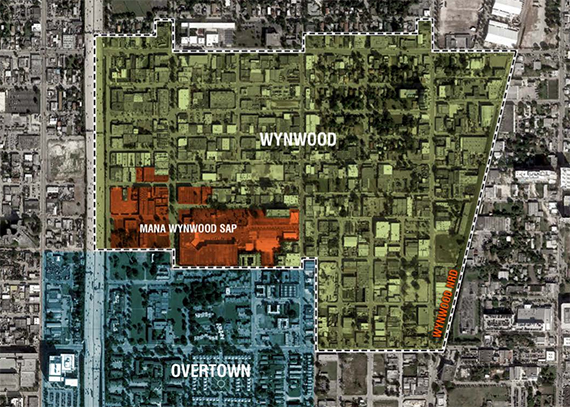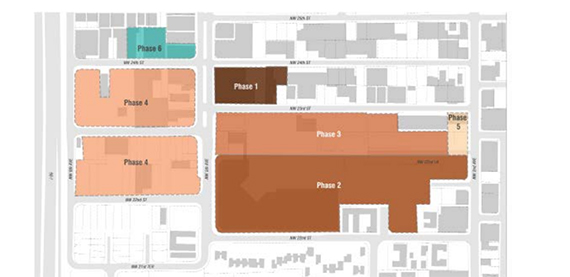It seemed to be a done deal. After months of negotiations, Moishe Mana and the Wynwood Business Improvement District had reached an agreement laying the groundwork for the developer’s plans to build a sprawling arts-focused commercial district in the neighborhood.
But during a contentious meeting Wednesday, board members of the Wynwood BID said Mana’s team is shaving off roughly $7.5 million in funds meant for the neighborhood’s public benefits program and jockeying for looser development restrictions.
The debate boiled down to two main disagreements over Mana’s proposed Special Area Plan, a vital part of his project that would give the developer zoning changes and allow him to build up to 24 stories in the neighborhood.
Under the BID’s previous resolution of approval, Mana’s team would pay about $10 million to the Wynwood Public Benefits Fund in exchange for taller development rights.
There were also restrictions in place to make sure Mana built out his 30-acre project’s culture-rich eastern half, which includes the Mana Commons public space, before the more commercial trade-oriented western half.
Both of those agreements, BID board members said, are now at risk.
“If the Mana team is determined to go through with these changes in their current form, I would recommend that we withdraw our support…” said David Polinsky, chairman of the BID’s planning committee and developer of the 250 Wynwood condominium. “That’s not to say that there aren’t other changes that can be negotiated. Perhaps they’ll come up with a new or modified plan.”

Overhead view of Wynwood, the Mana Special Area Plan and Overtown
“The Haircut”
In the new proposal, Wynwood would receive just less than $2.5 million of the original $10 million in public benefits funding, with the difference going to the Southeast Overtown/Park West Community Redevelopment Agency.
As Polinsky explained during the meeting, Mana’s $10 million contribution was already at a significantly lower level than the BID originally wanted.
Under the recent neighborhood upzoning, he said, developers can pay $13.66 per square foot to purchase additional height entitlements. But Mana and the BID eventually negotiated that rate down to $4 per square foot by promising other extensive public benefits.
Bernard Zyscovich, Mana’s architect for the project, said the shift in funds came at the behest of Miami City Commissioner Keon Hardemon, whose district includes Overtown.
While meeting with Hardemon, Zyscovich said the commissioner asked Mana’s team to restructure its agreement to also benefit Overtown, which had been overlooked in the original development plan.
“Those new meetings resulted in one very big simple statement, which is ‘You haven’t looked to the south at all; Wynwood has evolved tremendously, but Overtown is still mired in the situation that it is,’” Zyscovich said.
“It was not a negotiation,” he added.
A request for comment on the discussion to commissioner Hardemon was not immediately returned. Mana’s public benefits contribution to the CRA comes out to $1.75 per square foot for the extra floors.
As for the BID’s objection to its significantly smaller payout, Zyscovich said that’s something the agency will have to take up with commissioner Hardemon. The dollar amount Mana is contributing to public funds isn’t changing, he said, but it’s up to Hardemon and the BID to hash out who gets what.
Mana’s attorney, Iris Escarra, stressed that the deal still retains a bevy of other public benefits to Wynwood: the $11 million Mana Commons open-air public space, just under $10 million in upgrades to public streetscapes and sidewalks, $8 million in water and sewer improvements in the neighborhood, a $140,000 transit stop with street art and a $2.2 million fire station.
Polinsky and the other board members weren’t satisfied with that answer.
“This notion that we’re going to take it up with [District 5] is quite honestly a cop out,” said Albert Garcia, vice chairman of the BID and COO of Wynwood retailer Mega Shoes. “That haircut that you’re referring to is more than a haircut. You’ve left us bald.”

Proposed phasing under the original Mana Special Area Plan
“Phase skipping”
The second main sticking point came down to what pieces of Mana’s 30-acre complex he intends to build first.
Under the previous agreement, Mana had to reach significant milestones in the building of the project’s eastern portion along Northwest Second Avenue, which would house most of the cultural elements like the Mana Commons, before breaking ground on the trade-oriented west.
The specific language states that if Mana wants to build towers up to 24 stories in the west, he needs building permits for at least 35 percent of the planned eastern half.
But citing harsh market conditions, Zyscovich said the developer now wants the option to build out the more profitable trade center first on Northwest Fifth Avenue. He said Mana’s team has been traveling the globe searching for potential tenants, hoping to create a “China-Latino” commercial center in his Miami complex.
“When we were in negotiations with you, we were pretty convinced the east would go first. Today we’re not sure that the same type of users that we imagined — the flex use, the domestic users — might occupy the east as quickly as we believed,” Zsycovich said. “If we can build and develop counter to the cycle that everyone is talking about turning down, that’s in our interest and that’s in your interest.”
The architect also said Mana could put up temporary flex space along Second Avenue to occupy the developer’s vacant land along Second Avenue while the western end gets built.
“What you’re trying to do is phase jump to allow a 24-story building before building any of the effective value-add components of the project,” said Joe Furst, managing director of Goldman Properties and chairman of the BID.
The debate, which lasted roughly two hours, resulted in an impasse. Board members of the BID and Mana’s team set another meeting date for Aug. 31 to set more time for negotiations, under the guise that the BID would pull its support if Mana moves forward with his plans in the current state.
Zyscovich said Mana’s team still intends to take its plans before the city commission’s Sept. 8 meeting for a second reading.
“Right now we’re in a position where we have an opportunity where we can accelerate the west and it’s important for us to be able to take advantage of that opportunity,” he said.
